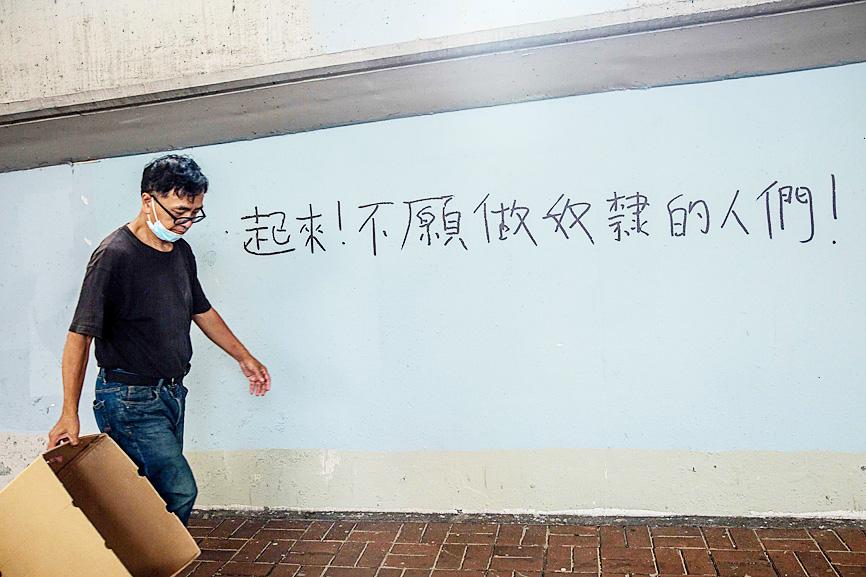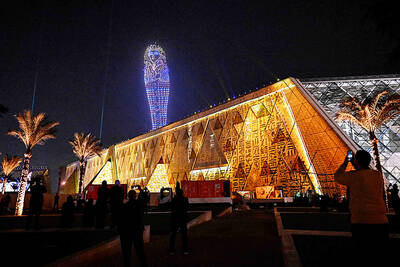Hong Kongers are finding creative ways to voice dissent after Beijing blanketed the territory in new security legislation and police began arresting people displaying now-forbidden political slogans.
Faced with the sudden threat of prosecution for anything that might promote greater autonomy or independence for the restless territory, residents are using word play and even subverting Chinese Communist Party dogma to express their frustration.
On a bridge in the busy shopping district of Causeway Bay, a key spot for pro-democracy protests over the past year, traffic thundered past newly daubed graffiti that declared: “Arise, ye who refuse to be slaves.”

Photo: AFP
The phrase is taken from the first line of China’s national anthem. While the graffito could conceivably have been written by a patriotic nationalist, it is most likely a declaration of dissent.
Social media and chat forums have filled with suggestions for how to find safer ways to protest after Beijing on Tuesday imposed broad legislation banning subversion, secession, terrorism and foreign collusion.
In a semi-autonomous territory used to speaking its mind, people would find ways around the legislation, said Chan Kin-man (陳健民), a veteran democracy advocate who has previously been jailed for his advocacy.
“In a public space, one might either not say anything or use an ‘officially approved’ language to protect themselves,” he told reporters. “But hidden language is something that cannot be banned by laws.”
The Hong Kong government on Thursday said the popular protest slogan, “Liberate Hong Kong, revolution of our times,” would now be deemed illegal.
For some, the phrase represents genuine aspirations to split Hong Kong from China, a red line for Beijing, but for many others it is a more general cry for democracy and an expression of rising frustration with Chinese rule.
However, coded language is allowing people to keep the slogan alive.
One version — “GFHG, SDGM” — uses English letters from the transliterated phrase gwong fuk heung gong, si doi gak ming.
Another, more complex, example mimics the tone and rhythm of the slogan using the numbers “3219 0246” in Cantonese.
Chinese characters also provide ample room for linguistic subversion. One phrase people have started adopting online is “seize back banana,” a play on the similarity in Chinese of Hong Kong (香港) and banana (香蕉).
Others have gone for English slogans that appear positive, but are a clear dig at Beijing — for example the Trumpian phrase “Make Hong Kong great.”
The very first arrest made under the new security legislation involved a deliberate linguistic challenge. During protests a day after the legislation was enacted, police announced that they had arrested a man with a flag that read, “Hong Kong independence,” posting a picture.
However, eagle-eyed Web sleuths zoomed in on the flag and spotted that a man had written a small “No” before his much larger phrase. The same phrase has since gone viral online.
Multiple pro-democracy restaurants and shops across the territory have taken down their “Lennon wall” displays expressing support for the pro-democracy movement after some were warned by police that they might violate the national security legislation.
One cafe replaced its wall with blank memos.
“What is essential is invisible to the eyes,” the shop wrote on Facebook, citing popular children’s book Le Petit Prince.
Another symbol of defiance that has replaced some protest art across the territory is blank white pages.
The gesture represents the inability to speak out and also “white terror,” a Chinese phrase used to describe political persecution.
“Suppression catalyzes people to fight back,” said Chan, who is also a sociology professor.
He likened the situation with how people in mainland China reveal dissent or anger toward the government with a wink and a nod.
“Hong Kong people will definitely respond more actively, it’s just that it might happen in a gray area,” he said.
A slogan that went viral this week was a quote by Mao Zedong (毛澤東), which read: “Those who suppress the student movements will not come to a good end.”

‘CHILD PORNOGRAPHY’: The doll on Shein’s Web site measure about 80cm in height, and it was holding a teddy bear in a photo published by a daily newspaper France’s anti-fraud unit on Saturday said it had reported Asian e-commerce giant Shein (希音) for selling what it described as “sex dolls with a childlike appearance.” The French Directorate General for Competition, Consumer Affairs and Fraud Control (DGCCRF) said in a statement that the “description and categorization” of the items on Shein’s Web site “make it difficult to doubt the child pornography nature of the content.” Shortly after the statement, Shein announced that the dolls in question had been withdrawn from its platform and that it had launched an internal inquiry. On its Web site, Le Parisien daily published a

China’s Shenzhou-20 crewed spacecraft has delayed its return mission to Earth after the vessel was possibly hit by tiny bits of space debris, the country’s human spaceflight agency said yesterday, an unusual situation that could disrupt the operation of the country’s space station Tiangong. An impact analysis and risk assessment are underway, the China Manned Space Agency (CMSA) said in a statement, without providing a new schedule for the return mission, which was originally set to land in northern China yesterday. The delay highlights the danger to space travel posed by increasing amounts of debris, such as discarded launch vehicles or vessel

RUBBER STAMP? The latest legislative session was the most productive in the number of bills passed, but critics attributed it to a lack of dissenting voices On their last day at work, Hong Kong’s lawmakers — the first batch chosen under Beijing’s mantra of “patriots administering Hong Kong” — posed for group pictures, celebrating a job well done after four years of opposition-free politics. However, despite their smiles, about one-third of the Legislative Council will not seek another term in next month’s election, with the self-described non-establishment figure Tik Chi-yuen (狄志遠) being among those bowing out. “It used to be that [the legislature] had the benefit of free expression... Now it is more uniform. There are multiple voices, but they are not diverse enough,” Tik said, comparing it

Prime ministers, presidents and royalty on Saturday descended on Cairo to attend the spectacle-laden inauguration of a sprawling new museum built near the pyramids to house one of the world’s richest collections of antiquities. The inauguration of the Grand Egyptian Museum, or GEM, marks the end of a two-decade construction effort hampered by the Arab Spring uprisings, the COVID-19 pandemic and wars in neighboring countries. “We’ve all dreamed of this project and whether it would really come true,” Egyptian Prime Minister Mostafa Madbouly told a news conference, calling the museum a “gift from Egypt to the whole world from a